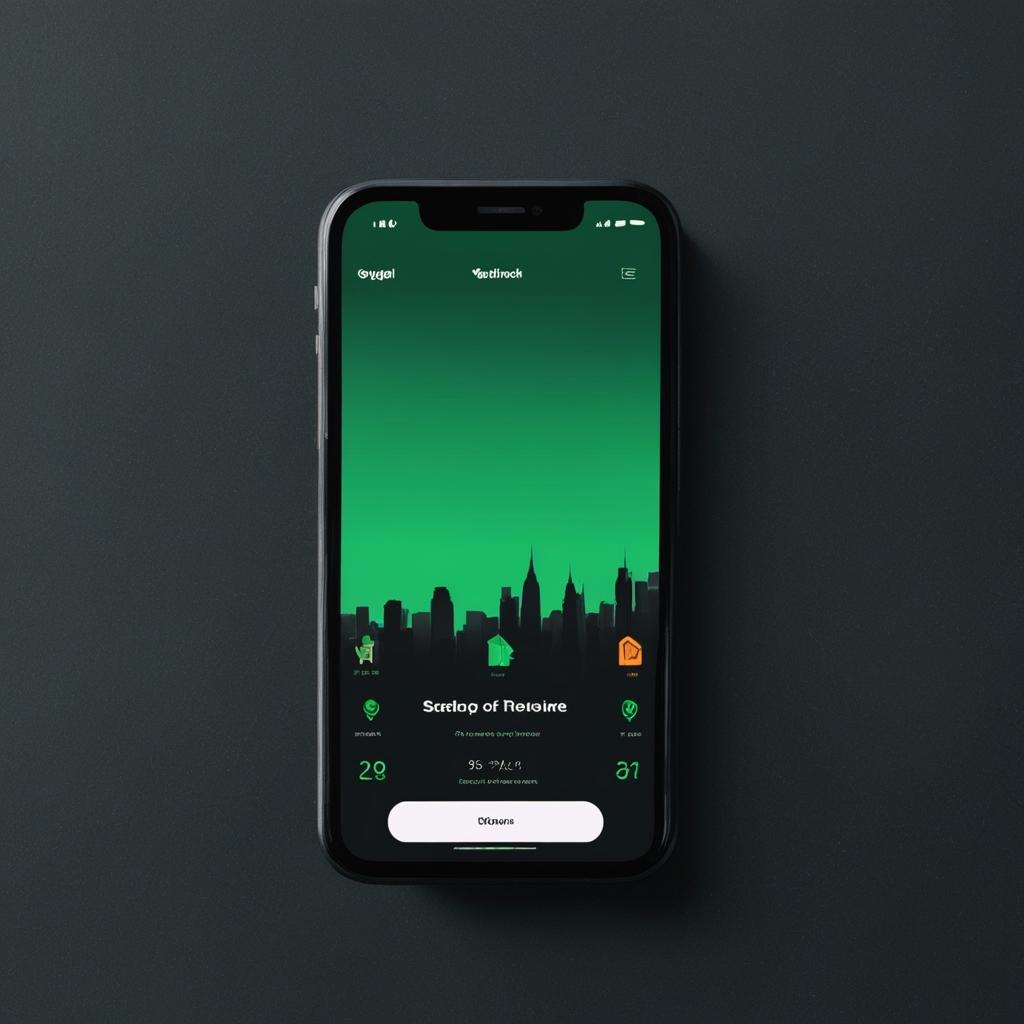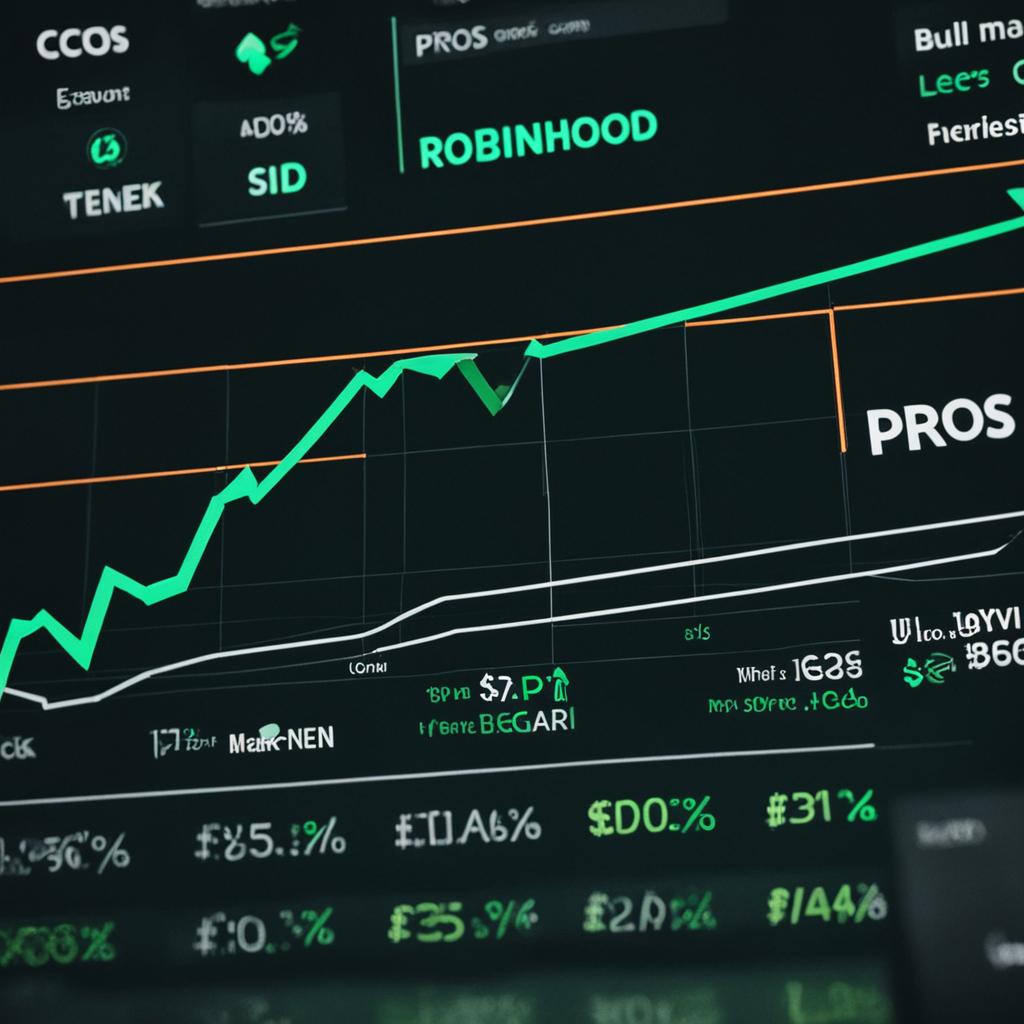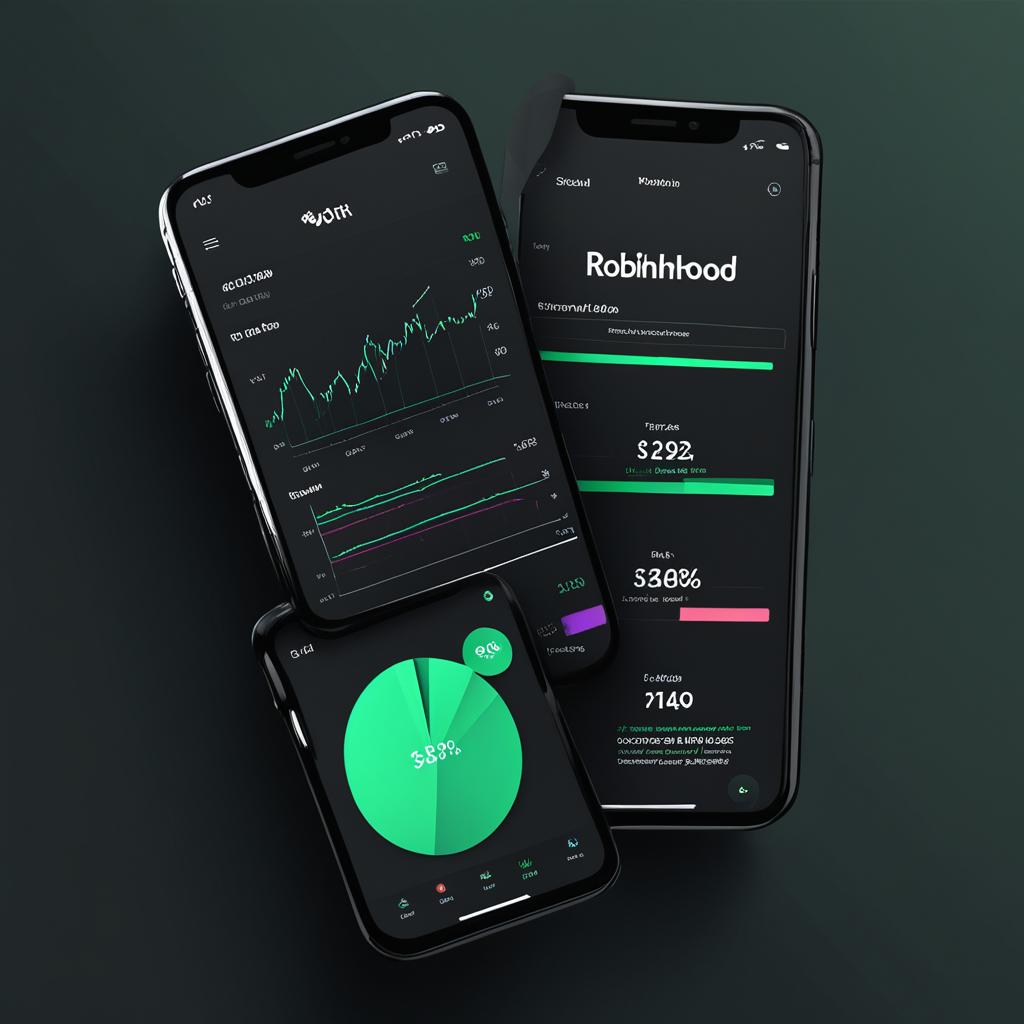When it comes to choosing an investing app, Public and Robinhood are two popular options that offer commission-free trading and other attractive features. But which one is the best fit for you? In this article, I will compare Public and Robinhood, highlighting their differences and helping you make an informed decision.
Public and Robinhood are both well-known names in the world of investing apps. They both offer commission-free trading, no account minimums, and the ability to buy fractional shares, making them great choices for beginner investors. However, there are key differences between the two that you should consider before making a decision.
One of the main differences between Public and Robinhood is in their fees. While both platforms offer commission-free trading for stocks and ETFs, Public charges a markup of 1% to 2% on cryptocurrency transactions, whereas Robinhood does not charge any markup. Robinhood also does not charge fees for options trading, making it a better choice for those interested in options. Public, on the other hand, charges a $75 fee for outgoing account transfers. Additionally, Robinhood offers a premium account option called Robinhood Gold, which has a monthly fee of $5.
Another important factor to consider is the available investments on each platform. Both Public and Robinhood allow users to trade stocks and ETFs, as well as buy fractional shares. However, Public goes a step further with its unique social trading platform. On Public, users can follow the portfolios of other investors and participate in community discussions about trading opportunities. Robinhood, on the other hand, does not offer these social features. It’s also worth noting that neither platform offers access to traditional investments such as mutual funds, CDs, or bonds.
The account types available on Public and Robinhood are another point of differentiation. While both platforms offer taxable brokerage accounts, neither allows investors to open other types of accounts such as IRAs or custodial accounts. Robinhood does, however, offer a margin account option called Robinhood Gold, while Public does not offer margin trading. If you’re specifically looking for account types like traditional IRAs or Roth IRAs, you may need to explore other investment apps.
When it comes to the mobile app and trading platforms, both Public and Robinhood have highly rated mobile apps that are user-friendly. However, Public’s app stands out with its focus on community groups and the ability to follow other users’ portfolios. Neither platform offers advanced trading features or comprehensive charting tools that experienced investors may prefer.
Public has some unique features that set it apart from Robinhood. These include social investing, where users can follow and interact with other investors, a dividend reinvestment plan (DRIP) that automatically reinvests dividends, and a commitment to not participating in payment for order flow. On the other hand, Robinhood offers options trading, a cash card that provides cashback rewards, and the opportunity to earn interest on uninvested cash.
In conclusion, the choice between Public and Robinhood ultimately depends on your individual preferences and investment goals. Public may be a better fit for those interested in social investing and following other investors, while Robinhood may be more appealing to those interested in options trading and advanced features. Consider factors such as available investments, account types, fees, and mobile app features to make an informed decision.
Key Takeaways:
- Public and Robinhood are both popular investing apps that offer commission-free trading and fractional shares.
- Public charges a markup on cryptocurrency transactions, while Robinhood does not.
- Robinhood offers a premium account option called Robinhood Gold with additional features.
- Public has a unique social trading platform, allowing users to follow other investors and participate in community discussions.
- Neither Public nor Robinhood offers access to traditional investments like mutual funds and bonds.
Public vs Robinhood: At a Glance
When it comes to investing apps, two popular choices for beginners are Public and Robinhood. Both apps offer commission-free trading, no account minimums, and the ability to purchase fractional shares, making them attractive options for those who are new to investing. However, there are important differences between the two that should be taken into consideration when deciding which platform to use.
“Public and Robinhood are both investment apps that offer commission-free trading, no account minimums, and the ability to buy fractional shares.”
First, let’s take a closer look at Public. This app not only provides a trading platform but also emphasizes social investing. Users can follow the portfolios of other investors, engage in community discussions, and learn from the experiences of successful traders. Public aims to create a sense of community and transparency, making investing a more collaborative and educational process. Additionally, Public offers a dividend reinvestment plan (DRIP) that automatically reinvests dividends and a commitment to not participating in payment for order flow (PFOF), ensuring that investors’ best interests are prioritized.
On the other hand, Robinhood is known for its user-friendly interface and broad range of investment options. The app offers commission-free trading for stocks, ETFs, and cryptocurrencies. Robinhood also provides the opportunity to trade options, which can be appealing to investors interested in more advanced strategies. In addition, Robinhood offers a cash card that provides cashback rewards and the chance to earn interest on uninvested cash, making it convenient for daily financial needs.
Here is a comparison table highlighting the key differences between Public and Robinhood:
| Public | Robinhood | |
|---|---|---|
| Commission-Free Trading | Yes | Yes |
| Social Investing | Yes | No |
| Dividend Reinvestment Plan (DRIP) | Yes | No |
| Payment for Order Flow (PFOF) | No | Not Specified |
| Options Trading | No | Yes |
| Cash Card | No | Yes |
| Interest on Uninvested Cash | No | Yes |
This table demonstrates the unique features and offerings of each app. Public stands out with its social investing aspect, dividend reinvestment plan, and commitment to transparency, while Robinhood offers options trading and additional financial services to enhance the user experience. Ultimately, the choice between Public and Robinhood depends on your personal preferences, investment goals, and desired features.
Public vs Robinhood: Commissions & Fees
When comparing Public and Robinhood, one important aspect to consider is the commissions and fees associated with using these investing apps. Both platforms offer commission-free trading for stocks and ETFs, which is a significant advantage for investors.
However, there are some differences when it comes to additional fees and charges. Let’s take a closer look:
Public Commissions & Fees
While Public offers commission-free trading for most investments, it does charge a markup of 1% to 2% on cryptocurrency transactions. This means that when buying or selling cryptocurrencies on Public, you will incur a small fee on top of the market price.
Additionally, Public charges a $75 fee for outgoing account transfers. This fee applies when you transfer your investments from Public to another brokerage or financial institution.
Robinhood Commissions & Fees
Robinhood, on the other hand, does not charge any markup on cryptocurrency transactions. This means that you can buy and sell cryptocurrencies on Robinhood without incurring any additional fees.
Furthermore, Robinhood does not charge fees for options trading. This makes it a better choice for those interested in trading options, as there are no additional costs associated with buying or selling options contracts.
However, it is worth noting that Robinhood charges a $75 fee for account transfers. This fee applies when you transfer your investments from Robinhood to another brokerage or financial institution.
Comparison of Commissions & Fees
To summarize the commissions and fees of Public and Robinhood:
| Platform | Commissions | Fees |
|---|---|---|
| Public | Commission-free trading for stocks and ETFs; 1% to 2% markup on cryptocurrency transactions |
$75 fee for outgoing account transfers |
| Robinhood | Commission-free trading for stocks, ETFs, and cryptocurrencies; No markup on cryptocurrency transactions; No fees for options trading |
$75 fee for account transfers |
It is also worth mentioning that Robinhood offers a premium account option called Robinhood Gold. This account has a monthly fee of $5 and provides additional features such as extended trading hours and the ability to trade on margin.
When choosing between Public and Robinhood, considering the commissions and fees is essential. Evaluate your investment strategy and preferences to determine which platform aligns best with your financial goals.
Public vs Robinhood: Investments Available
When it comes to investments, both Public and Robinhood offer a range of options for users. Let’s take a closer look at what each platform has to offer:
Stocks and ETFs
Both Public and Robinhood allow users to trade stocks and ETFs. Whether you’re interested in buying shares of your favorite company or diversifying your portfolio with exchange-traded funds, both platforms provide access to these popular investment instruments.
Fractional Shares
Investing in fractional shares has become increasingly popular, especially for those who want to invest in high-priced stocks without purchasing a whole share. Luckily, both Public and Robinhood offer the option to buy fractional shares, making it easier for investors to get started with smaller budgets.
Social Trading (Exclusive to Public)
One unique feature that sets Public apart is its social trading platform. With Public, you can follow the portfolios of other investors, gaining insights and inspiration for your own investment decisions. Additionally, you can participate in community discussions about trading opportunities, making investing a more collaborative and engaging experience.
Traditional Investments
It’s important to note that neither Public nor Robinhood offers access to traditional investments such as mutual funds, CDs, or bonds. If you’re looking to diversify your portfolio with these types of assets, you may need to explore other investment apps or platforms.
| Public | Robinhood | |
|---|---|---|
| Stocks | ✔️ | ✔️ |
| ETFs | ✔️ | ✔️ |
| Fractional Shares | ✔️ | ✔️ |
| Social Trading | ✔️ | ❌ |
| Mutual Funds | ❌ | ❌ |
| CDs | ❌ | ❌ |
| Bonds | ❌ | ❌ |
Overall, both Public and Robinhood offer a range of investments for users to choose from. While Public stands out with its social trading features, Robinhood provides a more traditional investment experience. Consider your investment goals and preferences to determine which platform aligns best with your needs.
Public vs Robinhood: Account Types Available
When considering the differences between Public and Robinhood, it’s essential to explore the account types available on each platform. While both offer taxable brokerage accounts, they do not provide options for opening other types of accounts like IRAs or custodial accounts. However, Robinhood has an additional account option called Robinhood Gold, which allows users to open a margin account.
Here is a breakdown of the account types available on Public and Robinhood:
| Account Type | Public | Robinhood |
|---|---|---|
| Taxable Brokerage Account | ✓ | ✓ |
| Individual Retirement Account (IRA) | ✗ | ✗ |
| Custodial Account | ✗ | ✗ |
| Margin Account | ✗ | ✓ |
It’s worth noting that if you’re specifically looking for account types like traditional IRAs or Roth IRAs, you may need to explore other investment apps that cater to those needs.

Public vs Robinhood: Mobile App and Trading Platforms
When it comes to convenience and accessibility, both Public and Robinhood offer user-friendly mobile apps that have received high ratings on app stores. These apps provide a seamless and intuitive user interface, making it easy for investors to manage their portfolios on the go.
Public’s mobile app stands out in its focus on community groups and social investing. With Public, you have the ability to follow other users’ portfolios and participate in community discussions about trading opportunities. This unique feature allows you to gain insights and learn from other investors, fostering a sense of camaraderie within the Public community.
On the other hand, Robinhood’s mobile app offers a streamlined trading experience with a minimalist design. It provides essential features for trading stocks and ETFs, including commission-free trading and the ability to buy fractional shares. Additionally, Robinhood offers extended trading hours, allowing investors to trade before the market opens and after it closes.
While both apps excel in their user-friendly interfaces and basic trading functionalities, neither Public nor Robinhood offer advanced trading features or comprehensive charting tools that experienced investors may prefer. These apps are best suited for beginner investors who prioritize simplicity and ease of use over advanced analytics and trading capabilities.
Key Features Comparison:
| Features | Public | Robinhood |
|---|---|---|
| Commission-free trading | ✓ | ✓ |
| Community groups and social investing | ✓ | 𐄂 |
| Ability to follow other users’ portfolios | ✓ | 𐄂 |
| Extended trading hours | 𐄂 | ✓ |
| Advanced trading features | 𐄂 | 𐄂 |
| Comprehensive charting tools | 𐄂 | 𐄂 |
In conclusion, both Public and Robinhood offer mobile apps that provide a seamless and user-friendly investing experience. While Public’s app emphasizes community interaction and social investing, Robinhood’s app focuses on simplicity and extended trading hours. Consider your preferences and priorities when evaluating the mobile apps of these two platforms to make an informed decision.
Public vs Robinhood: Unique Features
When comparing Public and Robinhood, it’s important to explore their unique features that set them apart. These features can greatly influence your investing experience and help you decide which app aligns better with your goals. Let’s take a closer look at what makes Public and Robinhood unique.
Public’s Social Investing
One of the standout features of Public is its emphasis on social investing. With Public, users have the opportunity to follow and interact with other investors. This creates a sense of community and allows for the sharing of investment ideas, strategies, and insights.
Whether you’re a beginner looking to learn from experienced investors or an avid investor wanting to share your own knowledge, Public’s social investing feature provides a unique platform for engagement and collaboration.
Public’s Dividend Reinvestment Plan (DRIP)
Another distinctive feature offered by Public is its Dividend Reinvestment Plan, known as DRIP. This feature automatically reinvests dividends earned on eligible securities, helping your portfolio grow over time. DRIP is a convenient way to compound your earnings and maximize the potential return on your investments without any additional effort.
No Payment for Order Flow
Public stands out by openly committing to not participating in payment for order flow. This means that Public does not receive payments from third-party market makers to execute trades, ensuring transparency and giving users peace of mind that their orders are executed in a fair and unbiased manner.
| Unique Feature | Public | Robinhood |
|---|---|---|
| Social Investing | ✅ | ❌ |
| Dividend Reinvestment Plan (DRIP) | ✅ | ❌ |
| No Payment for Order Flow | ✅ | N/A |
| Options Trading | ❌ | ✅ |
| Cash Card with Cashback Rewards | ❌ | ✅ |
| Earn Interest on Uninvested Cash | ❌ | ✅ |
Note: The table above summarizes the unique features of Public and Robinhood for easy comparison.
Robinhood, on the other hand, offers its own set of unique features that differentiate it from Public.
Options Trading
One key feature that Robinhood offers is options trading, which allows users to trade options contracts. This feature provides users with additional investment strategies and opportunities beyond traditional stock trading.
Cash Card with Cashback Rewards
Robinhood offers a cash card that enables users to make purchases and earn cashback rewards. This feature adds a layer of convenience and rewards for users who frequently make purchases using their investment app.
Earn Interest on Uninvested Cash
With Robinhood, users can also earn interest on their uninvested cash. This feature allows for the potential growth of idle funds, making sure your money continues to work for you even when it’s not actively invested.
Both Public and Robinhood offer unique features that cater to different investing preferences. Consider these distinctive aspects when deciding which app best fits your investment goals and interests.

Pros and Cons of Public
When considering the Public app, there are several pros and cons to take into account. Let’s explore the advantages and disadvantages:
Pros of Public:
- Social Investing Features: Public offers a unique social investing experience that allows users to follow other investors, learn from their strategies, and engage in community discussions. This feature fosters a sense of community and collaboration.
- Commission-Free Trading: Trading on the Public app is completely commission-free, making it an attractive option for cost-conscious investors.
- Fractional Shares: Public allows users to invest in fractional shares, making it more accessible for those with limited funds to diversify their portfolios.
Cons of Public:
- Limited Research and Analysis Tools: Compared to other investment platforms, the Public app has limited research and analysis tools available for users. This may be a drawback for those who heavily rely on in-depth research before making investment decisions.
- No Options Trading: Public currently does not offer options trading, which may be a disadvantage for investors who wish to engage in this type of trading strategy.
- Simplistic Data and Charting: The data and charting capabilities of the Public app are more simplistic compared to other platforms. This may be a drawback for experienced investors looking for advanced technical analysis tools.
Overall, the Public app offers unique social investing features and commission-free trading, which can be beneficial for beginner investors and those who value community engagement. However, it does have limitations in terms of research tools, options trading, and data visualization. Consider these pros and cons when deciding if the Public app is the right fit for your investment needs.
Pros and Cons of Robinhood
As an avid user of the Robinhood app, I’ve discovered several pros and cons that you should consider before deciding whether it’s the right investing platform for you.
Pros of Using the Robinhood App
- Commission-free trades: One of the biggest advantages of Robinhood is that it offers commission-free trades for stocks, ETFs, and options. This can save you significant costs compared to traditional brokerages.
- No minimum deposit requirements: With Robinhood, you can start investing with any amount. There are no minimum deposit requirements, making it accessible for beginners or those with limited funds.
- Extended trading hours: Robinhood allows you to trade before the market opens and after it closes, giving you more flexibility to take advantage of market movements.
- Ability to trade options: If you’re interested in options trading, Robinhood provides an intuitive platform to execute these trades. It’s an excellent feature for experienced investors looking to diversify their strategies.
Cons of Using the Robinhood App
- Limited research resources: Unlike some other investment platforms, Robinhood provides minimal research and analysis tools. You may need to rely on external sources for in-depth market research.
- Absence of mutual funds and bonds: Robinhood primarily focuses on individual stocks, ETFs, and options. If you’re looking to invest in mutual funds or bonds, you may need to explore other platforms that offer these types of investments.
- Lack of access to financial advisors: Robinhood does not provide access to financial advisors or personalized investment advice. If you prefer expert guidance, you may need to consider alternative platforms that offer these services.
Overall, the Robinhood app is a powerful tool for commission-free trading and offers unique advantages such as extended trading hours and options trading. However, it may not be suitable for investors seeking comprehensive research resources or access to a wide range of investment options. Consider your investment goals and preferences to determine if Robinhood aligns with your needs.

Note: The provided image above showcases a visual representation of the pros and cons of the Robinhood app, summarizing the information discussed in this section.
Public vs Robinhood: Which is Better for You?
The decision between the Public and Robinhood investing apps ultimately depends on your individual preferences and investment goals. Both platforms offer commission-free trading and other attractive features, but there are key differences to consider.
If you are interested in social investing and following other investors, Public may be the better fit for you. With Public, you can participate in community discussions, follow the portfolios of other users, and learn from their investment strategies. It’s a great platform for connecting with like-minded investors and gaining insights from a community of traders.
On the other hand, if options trading and advanced features are more appealing to you, Robinhood may be the better choice. Robinhood offers options trading, extended trading hours, and a premium account option called Robinhood Gold. This account type provides additional features such as access to level II market data and the ability to trade on margin.
When making your decision, consider the following factors:
- Available investments: Evaluate the range of stocks, ETFs, and other assets that each app offers. Ensure that the app you choose supports the investments you are interested in.
- Account types: Consider the types of accounts each app supports. If you have specific account needs, such as traditional IRAs or Roth IRAs, make sure the app accommodates them.
- Fees: Compare the fee structures of both apps, including commissions and any other charges. Be aware of any fees that may affect your overall investment returns.
- Mobile app features: Evaluate the user interfaces, available features, and overall ease of use of the mobile apps. The app you choose should have a user-friendly interface that aligns with your investing style.
Remember, there is no one-size-fits-all answer to which app is better. It’s important to assess your individual needs and priorities before making a decision. Consider the factors mentioned above and align them with your own investing goals to find the app that best suits you.
Public vs Robinhood Comparison Table
| Public | Robinhood | |
|---|---|---|
| Available investments | Stocks, ETFs, fractional shares | Stocks, ETFs, options |
| Account types | Taxable brokerage accounts | Taxable brokerage accounts, Robinhood Gold (premium) |
| Fees | Commission-free trading, markup on cryptocurrency transactions | Commission-free trading, fee for outgoing account transfers, Robinhood Gold subscription fee |
| Mobile app features | Social investing, following other users’ portfolios | Options trading, extended trading hours |
*Note: The comparison table provides a high-level overview of some key differences between Public and Robinhood. It is important to conduct thorough research and consider additional factors before making a final decision.*
By carefully evaluating these factors and considering your own investment preferences, you can make an informed decision about whether Public or Robinhood is the better investing app for you.
Alternatives to Consider
If neither Public nor Robinhood meets your specific needs, there are other investment apps to consider. Here are some popular alternatives:
- SoFi Active Investing
- Fidelity
- TD Ameritrade
These platforms offer a range of features and account types that may better align with your investing style and goals.
Comparison of Alternative Investing Apps
| App Name | Commission Fees | Available Investments | Account Types | Mobile App Features |
|---|---|---|---|---|
| SoFi Active Investing | Commission-free | Stocks, ETFs, Cryptocurrency | Taxable brokerage account, Roth IRA, Traditional IRA | User-friendly interface, investment research tools |
| Fidelity | Commission-free | Stocks, ETFs, Options, Mutual Funds | Taxable brokerage account, Roth IRA, Traditional IRA, Custodial account | Advanced trading tools, educational resources |
| TD Ameritrade | Commission-free | Stocks, ETFs, Options, Mutual Funds | Taxable brokerage account, Roth IRA, Traditional IRA, Custodial account | Powerful trading platform, extensive investment research |
Conclusion
In conclusion, both Public and Robinhood are reputable investment apps that offer commission-free trading and other attractive features. The decision between the two ultimately depends on factors such as your investment preferences, desired account types, and specific features that are important to you.
When comparing Public and Robinhood, it’s important to consider the following:
- Your investment goals and strategies
- Available investment options
- Account types offered
- Mobile app features
- Fees and pricing structures
- Social investing capabilities
- Access to advanced trading features
To help make your decision, compare the pros and cons of each app and determine which aligns better with your investment needs. It may also be beneficial to try out demo accounts or read user reviews to gain insights into the user experience of each app.
Your investment journey is unique, so take your time to assess your options and consider your risk tolerance, long-term goals, and desired level of involvement. Remember, it’s always a good idea to consult with a financial advisor before making any investment decisions.
Further Reading
If you’d like to learn more about Public and Robinhood, as well as other investment apps, you can check out our comprehensive reviews and comparisons. These resources provide in-depth analysis and information to help you make informed decisions about your investment options.
Here are some valuable resources to guide you:
Public App Review
- Review of Public App features and functionality
- User experiences and feedback
- Pros and cons of using the Public App
Robinhood App Review
- Review of Robinhood App features and functionality
- User experiences and feedback
- Pros and cons of using the Robinhood App
Public App Comparison
- Comparison of Public App with other investment apps
- Detailed analysis of Public’s unique features
- Pros and cons of choosing Public as your investment platform
Robinhood App Comparison
- Comparison of Robinhood App with other investment apps
- Detailed analysis of Robinhood’s unique features
- Pros and cons of choosing Robinhood as your investment platform
Public App Alternatives
- Explore alternative investment apps similar to Public
- Comparison of features, fees, and investment options
- Considerations for finding the right app for your investment goals
Robinhood App Alternatives
- Explore alternative investment apps similar to Robinhood
- Comparison of features, fees, and investment options
- Considerations for finding the right app for your investment goals
These reviews and comparisons will provide you with a comprehensive understanding of the strengths and weaknesses of both Public and Robinhood, as well as alternative investment apps. By diving deeper into the details, you can make a more informed decision on which app aligns best with your investing aspirations. It’s crucial to weigh the pros and cons and consider your individual preferences and goals when choosing an investment platform.

| Public App Review | Robinhood App Review | Public App Comparison | Robinhood App Comparison |
|---|---|---|---|
| Features and functionality | Features and functionality | Comparison with other investment apps | Comparison with other investment apps |
| User experiences and feedback | User experiences and feedback | Detailed analysis of unique features | Detailed analysis of unique features |
| Pros and cons | Pros and cons | Pros and cons of choosing Public | Pros and cons of choosing Robinhood |
Best Trading Platforms of 2024
If you’re looking for the best trading platforms of 2024, look no further! As a seasoned investor, I have carefully evaluated a variety of investment apps based on their features, user experience, and customer reviews to help you find the platform that best suits your needs and goals.
Top Investment Apps
Here are the top-rated investment apps that made it to the top of my list:
| Platform | Features | User Experience | Customer Reviews |
|---|---|---|---|
| Fidelity | Comprehensive research tools, extensive investment options | Intuitive interface, customizable dashboard | Positive feedback, high ratings |
| TD Ameritrade | Advanced trading tools, educational resources | User-friendly platform, robust mobile app | Rave reviews, excellent customer support |
| Charles Schwab | Low-cost trades, wide range of investment options | Streamlined interface, in-depth research | Favorable reviews, strong reputation |
These platforms have proven track records and are trusted by millions of investors. Whether you’re a beginner or an experienced trader, they offer the tools and resources to help you make informed investment decisions.
Remember, the key to finding the best trading platform is to consider your unique investment goals and preferences. Take the time to explore each app’s features and compare them against your specific requirements. This will ensure that you choose a platform that aligns perfectly with your needs.
Is Investing through Apps Safe?
When using investing apps, it’s natural to be concerned about the safety and security of your investments. With the increasing reliance on technology, it’s crucial to understand the measures in place to protect your assets and personal information.
App Security Features:
- Two-Factor Authentication: Many investing apps provide an extra layer of security by implementing two-factor authentication. This means that in addition to your password, you will need to enter a unique verification code sent to your registered device.
- Encryption: Data encryption is a key feature of secure investing apps. It ensures that your personal and financial information is protected by encrypting it during transmission and storage.
- Biometric Authentication: Some apps offer biometric authentication, allowing you to use your fingerprint or face recognition to access your account. This adds an extra layer of security by using unique biometric data for verification.
- Secure Socket Layer (SSL): Look for apps that utilize SSL technology to secure communication between their servers and your device. SSL ensures that data exchange remains encrypted and protected from unauthorized access.
Investing apps are aware of the importance of maintaining user trust, so they invest heavily in app security to protect their users’ assets and personal information.
It’s crucial to note that while investing apps have security features in place, it’s also essential for users to practice good cybersecurity habits. This includes using strong, unique passwords, regularly updating your app, and being cautious of phishing attempts or suspicious links.
The Importance of App Reliability
Alongside app security, app reliability is another important aspect to consider when investing through apps. A reliable app ensures that your trades are executed promptly and accurately, minimizing disruptions and potential losses. To ensure app reliability:
- Choose well-established and reputable investing apps that have a track record of reliability.
- Read user reviews and look for feedback on app performance and reliability.
- Consider the app’s uptime and maintenance schedule to understand potential downtime and plan your trading activities accordingly.
- Regularly update your app to benefit from the latest bug fixes and enhancements.
By prioritizing both app security and reliability, you can invest confidently, knowing that your assets are safeguarded and your trades are executed without disruptions.
| App Security Features | App Reliability |
|---|---|
| Two-Factor Authentication | Choose well-established and reputable apps |
| Encryption | Read user reviews and feedback |
| Biometric Authentication | Consider app uptime and maintenance |
| Secure Socket Layer (SSL) | Regularly update your app |
Investing through apps can provide convenience and accessibility, but it’s essential to prioritize the safety and reliability of the platforms you choose. By selecting investing apps with strong security measures and a history of reliability, you can confidently navigate the digital landscape while growing your investments.
Important Considerations in Choosing an Investing App
When it comes to selecting an investing app, there are several factors that you should consider to ensure you make the right choice. These factors can significantly impact your investment experience and ultimately determine the app that best aligns with your goals and preferences.
One of the crucial considerations is the fees associated with the app. Look for an investing app that offers low or no commission fees, as this can save you money in the long run. Additionally, consider any potential hidden fees, such as those for account transfers or premium features, as they can impact the overall cost of using the app.
Another key factor is the available investment options. Different apps may offer varying selections of stocks, ETFs, and other investment types. Ensure that the app you choose provides the investment options you are interested in or have a diverse range of choices to suit your investment strategy.
Account types and customer support are also important considerations. Some apps may only offer taxable brokerage accounts, while others provide options for retirement accounts like IRAs. Consider the account types that are important to you and choose an app that meets your specific requirements. Additionally, reliable and accessible customer support can be vital for addressing any issues or concerns that may arise during your investment journey.
FAQ
What makes Public and Robinhood different from each other?
While both Public and Robinhood offer commission-free trading and fractional share trading, they differ in terms of fees, available investments, account types, and mobile app features.
Are there any fees associated with trading on Public and Robinhood?
Both Public and Robinhood offer commission-free trading for stocks and ETFs. However, Public charges a markup on cryptocurrency transactions, while Robinhood does not. Robinhood also does not charge fees for options trading.
Can I trade stocks and ETFs on both Public and Robinhood?
Yes, both Public and Robinhood allow users to trade stocks and ETFs. They also offer the option to buy fractional shares.
Are there any account types available on Public and Robinhood?
Both platforms offer taxable brokerage accounts. However, they do not provide access to other types of accounts such as IRAs or custodial accounts.
What are the unique features of Public and Robinhood?
Public offers a social trading platform where users can follow other investors’ portfolios and participate in community discussions. Robinhood, on the other hand, offers options trading and a cash card with cashback rewards.
What are the pros and cons of using the Public app?
Pros of using Public include its social investing features, commission-free trading, and the ability to invest in fractional shares. However, some potential drawbacks are limited research tools and the absence of options trading.
What are the pros and cons of using the Robinhood app?
Pros of using Robinhood include commission-free trading, no minimum deposit requirements, and the ability to trade options. Some potential cons are limited research resources and the absence of mutual funds and bonds.
How do I decide between Public and Robinhood?
The choice ultimately depends on your individual preferences and investment goals. If you’re interested in social investing and following other investors, Public may be a better fit. If you’re interested in options trading and advanced trading features, Robinhood may be more appealing.
Are there any alternatives to Public and Robinhood?
Yes, some alternatives to consider include SoFi Active Investing, Fidelity, and TD Ameritrade. These platforms offer a range of features and account types that may better suit your investing style and goals.
How can I ensure the safety of my investments when using investing apps?
Investing apps have security measures in place to protect your assets and personal information. However, it’s important to choose a reputable app and follow best practices such as using strong passwords and enabling two-factor authentication.
What factors should I consider when choosing an investing app?
Important considerations include fees, available investments, account types, customer support, and the overall user experience. By evaluating these factors, you can make an informed decision and choose an app that aligns with your goals and preferences.
Our Friends
- https://www.fool.com/the-ascent/buying-stocks/public-vs-robinhood/
- https://millennialmoney.com/public-vs-robinhood/
- https://www.creditdonkey.com/public_robinhood.html
Money posts:
 Robinhood vs. Vanguard: Which is the Better Platform? (2024)
Robinhood vs. Vanguard: Which is the Better Platform? (2024)
 Is Robinhood Gold Worth It? (What $5 per Month Gets You) (2024)
Is Robinhood Gold Worth It? (What $5 per Month Gets You) (2024)
 Webull vs. Robinhood | What Sets Them Apart?
Webull vs. Robinhood | What Sets Them Apart?
 Public.com Review | Investing in Fractional Assets
Public.com Review | Investing in Fractional Assets
 Acorns vs. Robinhood | Which Investing App is Best for You? (2024)
Acorns vs. Robinhood | Which Investing App is Best for You? (2024)
 Public vs Webull: Which Trading App Is Best? (2024)
Public vs Webull: Which Trading App Is Best? (2024)
 Leaving Robinhood? 9 Robinhood Alternatives That Are (2024)
Leaving Robinhood? 9 Robinhood Alternatives That Are (2024)
 12 Best Micro Investing Apps Right Now (2024)
12 Best Micro Investing Apps Right Now (2024)

